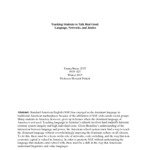Teaching Students to Talk Real Good: Language, Networks, and Justice

View/
Author
Busse, Emma L.
Subject
Washington and Lee University, Shepherd Poverty Program
English language
Discrimination
Hegemony
Linguistics
Language acquisition
Metadata
Show full item recordDescription
Emma L. Busse is a member of the Class of 2015 of Washington and Lee University. Capstone; [FULL-TEXT RESTRICTED TO WASHINGTON AND LEE UNIVERSITY LOGIN] Standard American English (SAE) has emerged as the dominant language in traditional American marketplaces because of the affiliation of SAE with certain social groups. Many students in America, however, grow up in homes where the dominant language of America is not used. Teaching language in America's schools involves hard tradeoffs between extreme system inequity and high individual costs. Given Bourdieu's understanding of the interaction between language and power, the American school system must find a way to teach the dominant language without overwhelmingly imposing the dominant culture on all citizens. To do this, there must be a focus on the role of networks, code switching, and the way that non-economic capital is valued in America. In order to promote SAE without undermining the language that students enter school with, there must be a shift in the way that Americans understand linguistics and value languages.